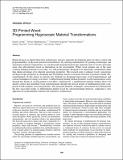3D-Printed Wood: Programming Hygroscopic Material Transformations
Author(s)
Correa, David; Reichert, Steffen; Menges, Achim; Papadopoulou, Athina; Guberan, Christopher; Jhaveri, Nynika; Tibbits, Skylar; ... Show more Show less
DownloadCorrea-2015-3D-Printed Wood_ Pro.pdf (659.2Kb)
PUBLISHER_POLICY
Publisher Policy
Article is made available in accordance with the publisher's policy and may be subject to US copyright law. Please refer to the publisher's site for terms of use.
Terms of use
Metadata
Show full item recordAbstract
Rapid advances in digital fabrication technologies and new materials development allow for direct control and programmability of physical material transformations. By utilizing multimaterial 3D printing technologies and anisotropic material compositions, we can physically program hygroscopic materials such as wood to precisely sense and self-transform based on fluctuations in the environment. While wood remains one of the most common building materials in use today, it is still predominantly designed to be industrially standardized rather than taking advantage of its inherent anisotropic properties. This research aims to enhance wood's anisotropic and hygroscopic properties by designing and 3D printing custom wood grain structures to promote tunable self-transformation. In this article we present new methods for designing hygroscopic wood transformations and custom techniques for energy activation. A differentiated printing method promotes wood transformation solely through the design of custom-printed wood fibers. Alternatively, a multimaterial printing method allows for greater control and intensified wood transformations through the precise design of multimaterial prints composed of both synthetic wood and polymers. The presented methods, techniques, and material tests demonstrate the first successful results of differentiated printed wood for self-transforming behavior, suggesting a new approach for programmable material and responsive architectures.
Date issued
2015-09Department
Massachusetts Institute of Technology. Computer Science and Artificial Intelligence Laboratory; Massachusetts Institute of Technology. Department of Architecture; Massachusetts Institute of Technology. Self-Assembly LabJournal
3D Printing and Additive Manufacturing
Publisher
Mary Ann Liebert, Inc.
Citation
Correa, David et al. “3D-Printed Wood: Programming Hygroscopic Material Transformations.” 3D Printing and Additive Manufacturing 2.3 (2015): 106–116.
Version: Final published version
ISSN
2329-7662
2329-7670